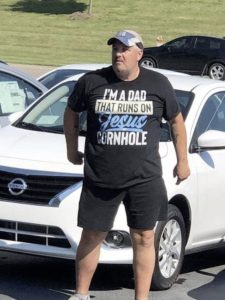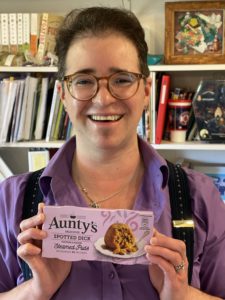Last weekend I did something I never thought I’d do: I attended a rally for Palestinian rights.
I’m not telling you anything new when I say that Zionism is the near-untouchable issue for American Jews. Only recently (as in, like, yesterday) did I notice the similarity to the taboos around being LGBTQ-affirming in evangelical Christian circles. I’ve always appreciated Judaism’s openness to debate, rational evidence, and new ideas. It seems out of character for our community to require hypocrisy and knowingly-not-knowing about any important issue.
Now, I am no longer a follower of any Bible-based religion. I was brought up “spiritual but not religious” yet with a clear cultural identity as a descendant of Jewish heritage. This included pride in our people’s intellectual and creative achievements, and vigilance about our minority status in America. My mothers were born in the 1940s. My maternal grandmother’s family (on my bio mother’s side) were first-generation immigrants from Poland who got out just in time. I grew up reading Holocaust stories and hearing about how President Roosevelt turned away a boat of Jewish refugees during World War II. My mother got me a passport as an infant “in case we have to flee to Israel”. The resurgence of neo-Nazism during the Trump administration would seem to bear out her fears.
I don’t remember why I started questioning the stories I’d been told about Israel-Palestine. It might have started with Palestinian-American writer Lisa Suhair Majaj’s essay “Journeys to Jerusalem”, which won our Winning Writers essay contest in 2016. It could have been something I read in the Interlink Publishing newsletter, a Northampton-based literary press run by Palestinian Michel Moushabeck. This year I ended up on the email list for the left-wing magazine Jewish Currents when I ordered their Bernie Sanders inauguration meme mug. I found a wealth of Jewish journalists and historians who made a compelling case for transforming Israel into a secular democracy where all religious and ethnic groups are equal. See the web version of their newsletter issue “Contextualizing the Crisis in Israel/Palestine” for a crash course in the history, and their page “A Guide to the Current Crisis” for background on the events of this past month.
That last sentence sounds obvious, doesn’t it? Isn’t that the American ideal?
Part of my problem is that I simply wasn’t aware what a “Jewish state” meant in practice. I was taught it meant: the one place that Jews could be secure, where we’d never be a persecuted minority. But a state designated as “for” one ethnic or religious group is likely to become a state that disadvantages every other group. The more I learned about the treatment of Palestinians as second-class citizens, the worse it seemed. I finally understood why the Black Lives Matter policy platform includes a pro-Palestine statement. The story I’d been told about the founding of Israel–a/k/a the Nakba, the great catastrophe that killed or displaced 700,000 Palestinians–sounded suspiciously like classic arguments for Europeans stealing land from Native Americans: we improved it, it was a desert, they were doing nothing with it until we came.
Thus I found myself last week holding a sign that said “Stop U.S. Aid to Apartheid Israel” or something like that. I felt queasy and shaky, standing outside my Congressman’s office in Northampton with some 50 other people, while passing cars honked appreciatively and an old fellow weaved across traffic yelling “Fuck Netanyahu!”
I am still wary about the rhetoric we use in support of Palestine, given that anti-Semitism remains a threat. It is tricky to avoid “Protocols of the Elders of Zion” territory when there is actually a powerful Jewish lobby and an international money machine that props up the Israeli government with U.S. cash and weapons. American evangelicals bear significant responsibility, too, for making U.S. foreign policy hawkish on Israel for apocalyptic reasons of their own. They’re happy to let Jews take the heat for Zionism, while they’re planning for our mass conversion or damnation.
I’m not telling this story for ally cookies. My point is that decolonization has a lot of stages and dimensions, and has to proceed by offering alternate solutions for the fears that drive ethnic supremacy. I’m less invested in whiteness than I am in Zionism because the latter speaks to my political vulnerability. I don’t need whiteness as much as some people, because I have money and education. I do need protection for the Jews. What’s changed is that I am facing the cost of Zionism and it seems too high–for all of us. The better answer is the same in Israel as in the diaspora: a multiethnic democracy with human rights for everyone.

